For anyone interested, here is the link to my discussion with Prof Steve Keen on Jim Mora’s show on Radio New Zealand yesterday morning. Despite the RNZ headline, the trans-Tasman travel “bubble” idea wasn’t any sort of focus, although Keen and I have quite different views on the issue beyond the very short-term. The thrust of my policy prescription post-Covid is outward to the entire world as much as we can, on the basis that there is no credible alternative path to a more productive and prosperous future. Keen, by contrast, favours a future in which New Zealand and Australia together trade as little as possible with the rest of the world. It seemed like a pretty bleak future to me, but at least he was honest enough to acknowledge that his preferrred path is one in which as nations we would be materially poorer in future, for the environment.
Sadly, the discussion did not get to Keen’s “modern debt jubilee” proposal that I discussed in a post last week.
The Small States and the New Security Environment (SSANSE) project is a collaboration of university researchers in a number of countries, including (in New Zealand) Canterbury University’s Anne-Marie Brady. Here in New Zealand, the initiative seems to encourage research and debate on a wider range of issues than the programme title itself might imply, and they have a page of contributions on a range of policy issues from quite a range of authors, under the heading “Pop-up Think Tank“. Anne-Marie has launched what she calls a Commission for a Post-Covid Future, and invited various people to contribute short papers.
As her tweet says, mine is apparently the first such paper to be released, in an abbreviated form on The Spinoff this morning. (The fuller version should eventually be on the SSANSE site, but here it is as well
Rebuilding New Zealand’s shattered economy post-Covid
(UPDATE: More nicely formatted on the SSANSE site here)
From the first page
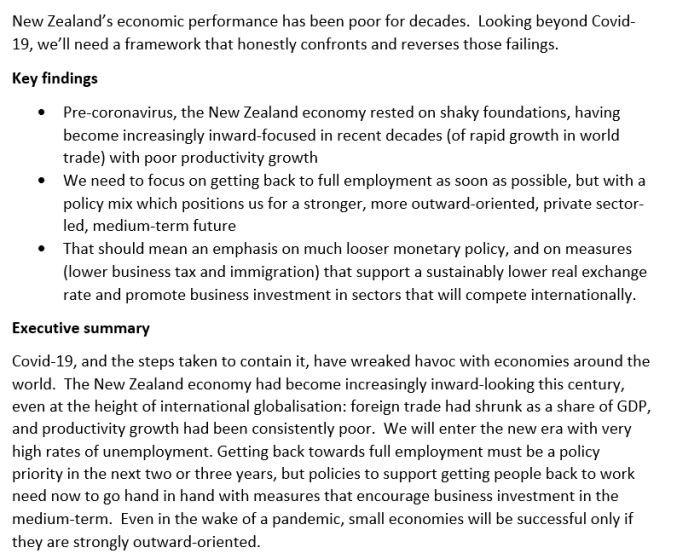
and from the body
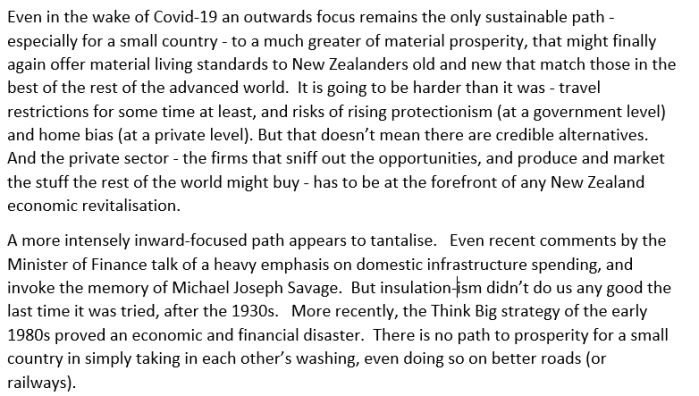
Macro policy has a big part in getting back to full employment
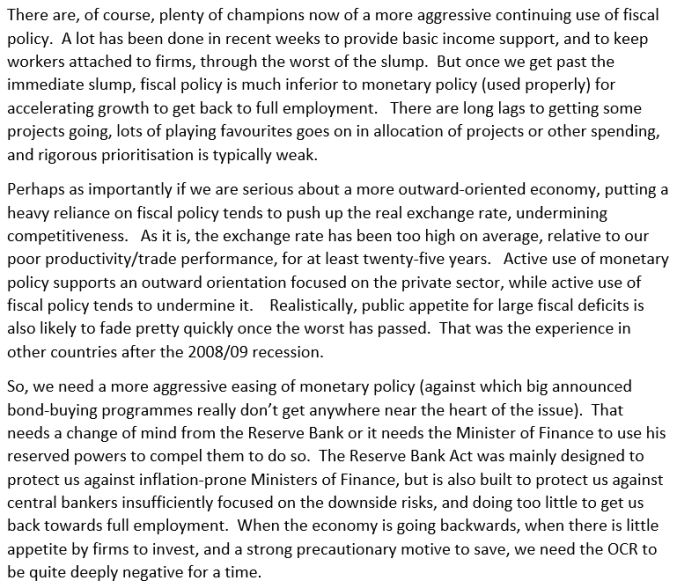
And longer-term, there are bits my friends from the market-oriented right will like
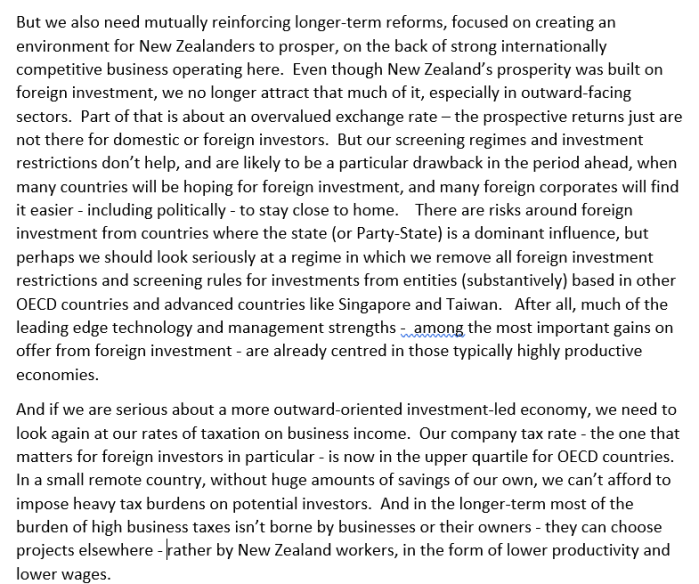
and a bit many of them will deplore

ending this way
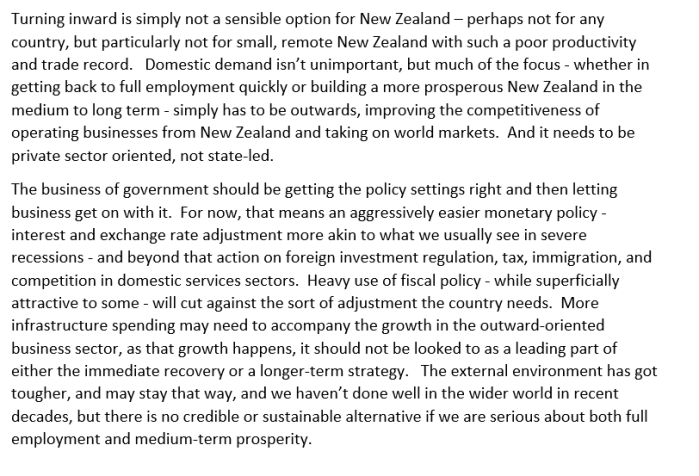
For anyone doubting that “we haven’t done well” bit in the last few lines, I refer you to the charts in my post on Saturday.
Oh, and the allusion to the once-upon-a-time campaign promise to “restore New Zealand’s shattered economy” was conscious and deliberate. They had good intentions too, even did some useful reforms, but they wouldn’t embrace the outward-oriented market-led approach that the situation really demanded. In many respects, our starting position now is quite a bit worse than it was then.
Lets not forget tax reforms can help and should be part of the discussion.
Click to access otago703148.pdf
LikeLike
Yes, I agree with much of Andrew’s analysis, if not all his policy conclusions.
LikeLike
Thanks Michael. I guess only people living in Wellington in safe government paid jobs could actually debate a move back to an autarkic New Zealand.
I bring in a substantial sum of foreign exchange to NZ which I’m good at spending 🙂
If the country becomes introverted and continues to lock itself in the cupboard under the stairs, then I leave. Simple….
I’m sure I’m not alone. We’d suffer a massive talent drain.
LikeLike
Sadly, of course, there would be plenty who stayed to prosper individually from the cosy insulated govt-empowered domestic economy, even as the country as a whole declined further.
LikeLike
That is where my mind went straight away. I might offer to set up a TV manufacturing plant in Queenstown and get the South Koreans to send all the parts, so I can “manufacture” them here. Might add a little NZ input, electrical cords??
LikeLike
Autarkic, thanks, learnt a new word today. Going back to the 1600’s, so not a new concept.
LikeLike
Can we be outward looking and environmentally sound at the same time? I wonder if the exemptions from environmental laws for farming and other exporters could be minimized with the monetary policies you suggest?
LikeLike
There will always be choices and tradeoffs but yes a much lower real exchange rate would make it easier to uphold/impose standards in other areas, be it water, methane, or reliance on cheaper foreign labour.
LikeLike
(1)
As to a “much lower” real exchange rate I would say “no!” What underlies this view that NZ exporters are so internationally weak and uncompetitive that they need a “much lower” exchange rate to survive and thrive?
A significantly lower exchange rate, manipulated and held low over the years (as I think you want) would decimate local companies selling imported goods, resulting in less competition. It will also hurt exporters who use imported intermediate goods and components for their products. Ultimately it will hurt every consumer through increased imported inflation, reducing disposable income. Even exporters want to buy capital goods and machinery, not to mention cars, appliances, electronics and the odd overseas trip.
Although you are talking about the real exchange rate (CPI-based measure I presume) but it is the nominal exchange rate where most of the adjustment effect will be felt given reasonably contained global inflation. If the nominal exchange rate crashes people will feel poorer, less inclined to invest domestically (other than in property) and I suspect when things return to normal many talented people who could immigrate to get paid in foreign currency would.
You never talk about are the years of restructuring costs and economic pain inherent in your plan. The economic damage isn’t just an unfortunate side effect it is the very point of what you are trying to do – drive those companies that cannot survive an artificially low exchange rate, out of business. Is this really what you want to hit businesses with at this time, has the Covid crisis not done enough harm that you would now inflict this on them too? There must be more balanced and humane approaches to improving economic growth than what you advocate.
(2)
You typically deride the fact that New Zealand used to manufacture television sets. You also persistently deride Trump and yet he had up until the time of the crisis managed to preside over a great resurgence in US manufacturing, a deliberate policy outcome, which has now been shown to be strategically sound as well as a boon for their local economy and trade. And it was all done without forcing their real exchange down. How?
While I’m not suggesting we should be making televisions sets, I do think we shouldn’t rule out being willing protect at some level our industries in situations where they are competing against importers from countries who subsidise or restrict competition in their countries or are otherwise predatory.
LikeLike
Recall that we are now starting from a position of v high unemployment and large scale, likely prolonged, econ dislocation. That should make the conversation quite different than if, eg, one were debating my proposed immigration policy from a starting position of full employment. The point of my policy approach is to get back to full employment as fast as possible, and give us a chance of stronger productivity growth over the long haul.
On 2) I just disagree. I don’t rule out there being merit in well-conducted US-led trade wars etc (as with real wars, they are costly but can be worthwhile) but I really struggle to see such a case for a tiny player like NZ.
LikeLike
It is actually ridiculous that when our NZD already trades at a massive 40% discount to the USD and a 44% discount to the Euro that we would consider that our NZD is overvalued. Any lower and we would be accused of currency manipulation and trigger anti dumping provisions in US and in Europe.
LikeLike
Bring back the TPP would be a good strategic option. NZ and Japan are the only ones that have ratified. We are blessed with highly productive land but we have a small population. The 100’s of millions in Asia need food security Surely that could be a basis for large scale economic expansion using all the tools of the 20th century. We are already world class in agriculture and horticulture. All we need now is some high level vision and planning, capital and the kiwis will take care of the rest. MNZGA.
LikeLike
No we are not world class. We are just cheap with the NZD trading at a 40% discount to the USD and 44% discount to the Euro.
LikeLike
Sound advice but will it fall on deaf ears when it comes to business and politicians?. Business has become addicted to cheap labour instead of investing in technology and new plant that would make us more productive. Our Prime Minister believes in globalism and open borders, so that anyone who wants to come here should be allowed to do so. National have used mass low skilled immigration as a steroid to artificially inflate economic performance measures – we are living with the downside consequences of that now and they will intensify in the coming Depression. In the post COVID 19 world world will New Zealanders demand change? It is certainly important to keep presenting alternatives Michael as you are so ably doing.
LikeLiked by 3 people
Yes… its been a real bugbear of mine to see companies spurn sound and viable capital investment because ‘workers are cheaper’… well maybe… I very much doubt that over a reasonable time frame… its as if the accountants are in charge and all they see is the increase in depreciation and the capital costs but none of the productivity benefits… short term muddled thinking by people who know the price of everything and the economic value of nothing…
Not keen on this Keen guy… died in the wool Keynesian and rabid leftie… we have to trade with the likes of China etc.. they like our stuff and will pay higher prices than the Australians for well produced and marketed good… I’m not keen on the idea of NZ becoming the Albaina of the Sth Pacific… being the Poland of the Sth Pacific was bad enough…
LikeLiked by 3 people
Since we have saved old people from dying, we now have the prospect of looking after them. Count on substantially more migrants for the health and aged sector.
LikeLike
Michael – have you seen that Ian Harrison has released a rebuttal of the U of O and TPM responses to his Covid paper on his website.
I’d note they appear not to have responded directly to him despite his reaching out to them for comments, but responded only in their own interests via the media.
I still believe this is a critically important issue – hopefully you can do a followup article?
LikeLiked by 1 person
Don’t think the U of O has anything other than a very very thin skin… they hate reasonable and viable criticism… and thats what is needed… have the debate!
I like Ian Harrison’s work. He should have more of a profile than he does at the moment.
LikeLike
I think Ian’s work is good and the conclusions look sound, but he doesn’t help his case by insinuating conspiracies and assuming everyone else is mentally incompetent.
LikeLike
Yes, in fact my website is hosting Ian’s response. I won’t be writing about the specific issue further here though- too many econ issues to focus on and just not enough time.
LikeLike
Took the link to the report and it’s persuasive. My instincts were to a fortress NZ; it echoes the protection of our Covid-19 family bubble but you are correct we need international investment to get export growth and increase employment.
“”… we should look seriously at a regime in which we remove all foreign investment restrictions and screening rules for investments from entities (substantively) based in other OECD countries and advanced countries like Singapore and Taiwan “”. It would take international diplomacy not to upset protectionist countries such as China, India, etc but by removing the “and Trade” from MFaT and simply insisting on reciprocal rights for foreign investment it could be achieved. It would be a waste of time if our business tax rates remain high because with an international business it is too easy to declare profits in the country with the lower tax rate and then follow it with the HO and R&D. It seems classic Cassandra – good idea at the right time which is also the wrong time. Foreign investors would need to see this as part of a political policy before the next election but announcing a dramatic drop in business taxes and welcoming foreign investment would not win votes. Note agile foreign investment means immigration with applications processed fast (INZ cannot even manage a consistent tourist visa in under a month) but that would be achieved by simply insisting all foreign workers are paid above a high threshold.
“” The per capita level of tradables sector activity was about the same at the end of last year as it was at the end of last century.”” Tradables includes exporting education; this is next to dead today but your policy to control immigration means it will be severely curtailed in future too. It doesn’t include tourism although tourism is considered an export. Since selling education has had big growth for years it means that what most of the public would call NZ’s tradables have actually been shrinking.
My summary: encourage small and medium export businesses capable of fast reaction to what will be dramatically changing opportunities. There are plenty of Kiwis working abroad who have the contacts and skills – they may be returning to NZ soon; opportunities knock.
LikeLike
Just a couple of things:
– tourism is in my indicator of tradables GDP,
– even if immigration was restricted I don’t think it would be too bad for university export education. Most university students return home on graduation and the really top notch ones would still be eligible.
On FDI I would oppose an unrestricted regime with China even with reciprocal rights: the PRC is a national security risk and there is no plausible separation that is robust between the public and private sector. I will dig out tomorrow the submission I made on the govt’s review of the Overseas Investment Act.
I, of course, have not the slightest expectation that our politicians will do sensible outward oriented stuff: I’m deeply pessimistic about the future of this country, and (at the margin) Covid just reinforces that pessimism.
LikeLiked by 3 people
So Tradables are good. Tradables per capita have not grown for 20 years. The two areas of Tradables that have grown are tourism and export education and both of these are decimated by the effects of the epidemic.
The China problem is reciprocity – they can buy our land but we cannot buy theirs; we have a rule of law that is only very rarely and temporarily overruled (eg Helen Clark’s Foreshore and Seabed legislation and the Urewera raids, current Covid shutdown) whereas China attitude to law is arbitrary (checkout disappearance of foreign booksellers); China has its 2017 national intelligence law that states “any organisation and citizen shall support and cooperate in national intelligence work”. So it is not difficult to identify reasons to exclude China except for the diplomatic fallout (and loss of political donations??).
Other countries restrict foreign businesses on economic grounds in various ways and we do it ourself by immigration rules (and by counter-productive unwarranted bureaucracy delaying visa processing); we should just require reciprocity for matters such as forced joint-ventures, purchase of free-hold land, employment of citizens (I know a Kiwi who was thinking of moving his business to the USA where almost all his customers are but he didn’t because the number of American citizens he would have legally had to employ was double the number he needed).
LikeLiked by 1 person
Other bits of tradables have also grown – incl dairy – but just not in per capita terms. Tourism and export educations last year were no higher as a share of GDP than i 02/03.
On the nature of the PRC issue re foreign investment, I strongly disagree. Here is my short submission to the govt review last year.
Click to access submission-on-reform-of-overseas-investment-act-2019.pdf
LikeLiked by 1 person
I think we are both retired and of about the same age Michael. I have often wondered if my deepening pessimism about the future of this country has to do with increasing age? But then I look at what is happening around us such as the Police being prepared to act unlawfully and to condone illegal behaviour, the majority’s seeming indifference to the loss of their civil liberties, the degradation of our public service, the racial preferment and polarisation, the influence on Chinese Communist Party money in our politics and our declining, low wage-low productivity economy and I believe pessimism is justified. In any case “misery loves company”.
LikeLiked by 1 person
That Mount Cook picture is just over the brow as the road joins Lake Pukaki. A few kilometers further on is Peters look out. There is one bus stop (thanks to recent landscaping) so you are lucky to be able to stop there (lots of parks at the head of the lake although Peters look out is better). If there is a bus up there there is a good chance the driver speaks Chinese or Korean.
As Eric Kaufman demonstrates people are prepared to take a drop in income for Brexit and “nativism” motivates Trump voters. In Alduous Huxley’s Brave New World today’s social norms are deprogrammed for more production. They greet each other with a T sign (Model T Ford). They change partners each night and discuss it openly as though it was “what are you having for dinner”. Jacinda Ardern references a primatologist at the UN. Who is “us”/”them” can change in a flash she says and appears to think it is do able (no doubt through the education system and NZ On Air). Social cohesion is now a matter of intervening in communication not singing Auld Lang Syne.
LikeLike